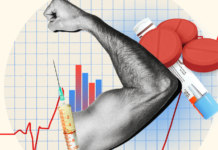BEING IN A LOVING, committed relationship is good for your health. It can lower stress, give you a sense of purpose, and even strengthen your immune system and help you live longer. There also may be a connection between relationships and your testosterone levels.
While research is mixed on the direct link between testosterone levels and relationships, there’s some evidence that certain aspects of having a partner, like sex and emotional connection, can influence your levels of the hormone. Other not-so-pleasant parts of being in a relationship, such as stress and fighting, might play a role, too.
When your testosterone—the key male sex hormone produced by the testicles—is low, it brings with it symptoms like fatigue, a depressed mood, erectile dysfunction, and low libido—all things that can affect relationships.
“We see that things like mood and stress impact our hormonal axis,” says Ryan Smith, M.D., associate urology professor and urologic microsurgeon specializing in men’s health at the University of Virginia Health. “So, there’s some data to suggest that when you’re in a healthy relationship, you may have lower stress levels and that may play a role.”
You’re likely happier and have an overall sense of well-being, when you’re in a healthy relationship, he adds. “But, how that translates to serum levels [or the measure of testosterone in your blood] is more challenging to interpret.”
Here’s a look at the relationship-testosterone link, specifically how being in a relationship could affect your levels and how low testosterone might affect your relationship. And, what to do if you suspect your testosterone levels are low.
How Relationships Affect Your Testosterone Levels
Overall, studies have shown that men in relationships tend to have lower testosterone. But, there are lots of variables. And, certain elements of relationships can have different effects on your levels, including:
The Length of the Relationship
The excitement and warm, fuzzy feeling of a new relationship may give your testosterone a boost. A 2015 study found that single men and men in new relationships had higher testosterone levels than men in long-term relationships. Researchers concluded that the findings showed that testosterone might play a role in motivating men to seek new mates.
It appears that the longer you’re in a relationship, the bigger impact on your hormonal levels. Research suggests that men who are in committed, romantic relationships (married or unmarried) have about 20 percent lower testosterone than men not in relationships.
How Happy You Are
It’s believed that the lower testosterone among men in long-term partnerships helps them to be more nurturing, which fosters loving, supportive relationships.
A 2016 study published in Hormones and Behavior found that older men with the most emotional support (four or more sources from romantic and social relationships) had lower testosterone than individuals with just one source of support. Lower testosterone helps facilitate supportive relationships, researchers said.
Other research found that the quality of a relationship, including satisfaction, commitment, and investment, lowered testosterone for both men and women, and that couples were more satisfied when one person had lower testosterone.
The Stress Level of Your Relationship
Fighting and conflict happen in every relationship from time to time. How often you have conflict and the stress that comes along with it might cause your testosterone to fluctuate.
In a 2018 study, 50 male-female newlywed couples were asked to discuss four marital problems and how much oppositional behavior they felt from their partner during the discussions. Saliva tests measured their testosterone. Men, but not women, showed “heightened testosterone reactivity” to opposition from their partners.
Some studies have shown that psychological, physical, and actual stress can lower testosterone levels, though.
How Affectionate You Are
Increased testosterone—or even testosterone replacement therapy—is often linked to rage and aggression, but that’s generally a myth, says Brian Black, D.O., an osteopathic board-certified physician in family medicine. “There are many other factors that contribute to aggressive behavior, such as genetics, environment, and upbringing.”
A study with animal subjects published in 2022 showed that testosterone increased nonsexual and prosocial behaviors in male rodents. When the subjects received a testosterone injection while with their partners, they showed “positive social responses,” like cuddling. Testosterone influences the activity of oxytocin cells, also known as the love hormone. So, that’s great news if you and your partner are regular cuddlers and generally affectionate.
How Much Sex You Have
Testosterone is responsible for sexual functioning, including getting erections and a healthy libido. Research is mixed on whether having sex regularly influences testosterone levels, although the testosterone-sex link is often seen when men start testosterone therapy. “Many see improvements in certain aspects of sexual health,” Dr. Smith says.
How Low Testosterone Might Impact Your Relationship
Testosterone plays a crucial role in many bodily functions. When your levels are low, you might experience a range of symptoms that could impact your relationship.
Not everyone with low testosterone, or hypogonadism, experiences symptoms, Dr. Black says. Those who do might have “decreased libido, erectile dysfunction, and decreased muscle mass.”
Decreased sex drive and erectile dysfunction could affect your sex life. This might increase stress, affect your sleep and cognitive function, and cause a disconnection with your partner.
“All those things could translate to having impacts on a relationship,” Dr. Smith says. “If a man undergoes treatment, if libido and potentially erectile function improve, maybe we could see that translating to improvement in their relationship.”
Low testosterone has also been linked to fatigue, depression, and a change in mood, Dr. Black says. There’s a connection between depression and relationship problems. When you’re generally not feeling well or like yourself, it can be difficult to connect with others, including your partner.
If you find that you’re experiencing any of these symptoms, it’s a good idea to talk to your doctor, Dr. Black emphasizes. They may recommend getting your testosterone levels checked and potentially prescribe testosterone replacement therapy.


























